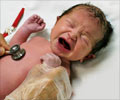Drug withdrawal signs are more commonly seen in infants, as there is an increase in prescribing both psychotropic medications and opioids to pregnant women.

‘Medications taken during pregnancy should balance the health of the mother and also have the potential impact on the development of fetus.’





So a team of US researchers based at Brigham and Women's Hospital and Harvard Medical School, set out to assess the impact of in utero exposure to both psychotropic medications and opioids on number of cases and severity of neonatal drug withdrawal.They analysed data from over 200,000 pregnant women who were enrolled in the Medicaid program a US government program that pays for healthcare services and who received a prescription for an opioid.
They then examined whether the risk of neonatal abstinence syndrome was increased among infants whose mothers were also prescribed psychotropic medication.
After taking account of several factors that could have affected the results (known as confounders), the absolute risk for neonatal drug withdrawal was substantially higher among women exposed to opioids and psychotropic medications than among women exposed to opioids alone.
The absolute risk of withdrawal among women exposed to prescription opioids alone was around 1%. Exposure to any single additional psychotropic medication (antidepressants or benzodiazepines or gabapentin) was associated with an increased risk of withdrawal.
Advertisement
The severity of the withdrawal symptoms also seemed to increase with concurrent exposure to psychotropic medications and opioids.
Advertisement
"In conclusion, our findings suggest that among women using prescription opioids during pregnancy, co-exposure to antidepressants, benzodiazepines, and gabapentin might be associated with an increased risk of drug withdrawal in the neonate," write the authors.
They suggest that clinicians "should be cautious in prescribing these medications together in late pregnancy and in prescribing psychotropic medications to women with known or suspected illicit opioid use."
Our findings also imply that it will be important for neonatologists and pediatricians to rethink treatment protocols for infants born to women who were prescribed multiple drugs during their pregnancy."
In a linked editorial, Stephen Patrick, Assistant professor of pediatrics and health policy at Vanderbilt University in Tennessee and colleagues say, despite some limitations "these findings are important in targeting prevention efforts and potentially in tailoring treatment of opioid exposed infants."
They point out that use of medications in pregnancy "must balance the health of the mother with the potential impact on developing fetus" and call for more funding for research and prevention, and an expansion of treatment options for affected mothers and their infants."
Source-Eurekalert









